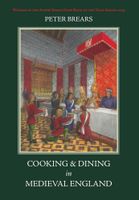Advertisement
Pottages of Almonds
By Peter Brears
Published 2008
Almonds were imported from southern Europe in large quantities, the royal household consuming almost 13 tons in 1286, and even modest households such as that of Dame Alice de Bryene buying 40lb in 1418–19.131 One of their major uses was to produce almond milk, the main vegetable alternative to cow’s milk for fast-day cookery. This involved shelling them, blanching them in boiling water to remove their brown skins, and then grinding them with wine, water or light stock. If dry blanched almonds were simply pounded in a mortar, they emerged as a useless oily mass, rather than a smooth emulsion, and so it was essential that they were blanched immediately before use. Some recipes specify 6½oz/180g almonds to each pint/600g of liquid, but the following proportions give good results.132 Some recipes specify white wine or light meat stock instead of water, to enhance their flavour.

